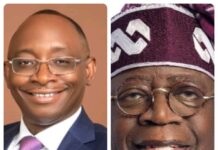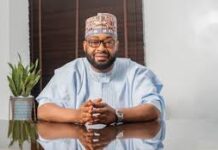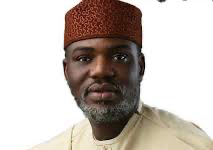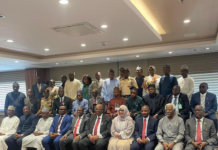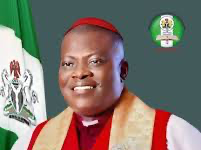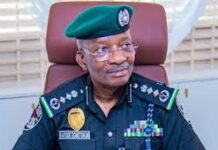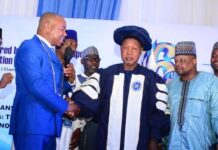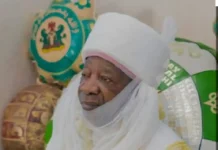Constitutional Validity of Referendum and Power Devolution By Prof Auwalu H. Yadudu
POLITICS DIGEST – Permit me to present to your august body some ideas, suggestions and recommendations which l hope will help you in carrying out the processes the two wings of the National Assembly have embarked upon for the alteration of the 1999 Constitution. Although l have read the 17-item lists of issues you invited comments on from members of the public, l wish, if you permit me, to address only four issues that speak to some of items directly and others consequentially.
Firstly, I intend to dwell on the constitutional validity, practicality and feasibility of referendum as a mechanism for the adoption of either an altered version of the existing document or of a wholly new one.
Secondly l shall briefly address some of
challenges associated with the vexed issue of devolution of powers by reference to how to juggle the legislative lists.
Thirdly, l will speak to the controversial matter of State Police and the place of Local Government system. In all these instances l shall propose some recommendations.
On Referendums
Of recent, it has become fashionable to lay all the evils bedeviling our polity, society, the economy etc at the door of the 1999 constitution, the authorship of which hasgratuitously been ascribed to me personally. My attitude to this ‘donated’ honour or infamy, depending on how you view it, is to laugh it off or humbly state that it is unearned. Viewed differently, It is idle talk engaged in by lazy commentators and, in some cases, otherwise distinguished elder statesmen and e-warriors.
A motley of critics of all hues and cries have disparaged the 1999 Constitution for telling a blatant lie when it claims in its preamble to have derived its authority and sovereignty from “we the people” when in fact it is the creature of a military decree. To remove the imprimatur of personalities from its vestiges and cure it of the fib, there have been varying calls for the emergence of wholly new constitution on which the “people” will confer legitimacy with its adoption through a referendum.
Regrettably, such calls have not come only from ‘separatist’ elements. Some clever chaps attempted to hoist the idea on the nation by calling for the adoption of a new constitution which they surreptitiously cooked during the National Conference of 2014.
A legal icon, a national leader of the bar and an elder statesman, has thrown his weight behind the idea by calling for the outright rubbishing of the 1999 Constitution and its substitution with the 1963 via the instrumentality of referendum.
One must observe that, apart from being subversive of existing constitutional and legal order from which all institutions and offices of the nation derive their legitimacy, such calls have tended to obfuscate issues and ignore facing basic questions of the legality, practicality and feasibility of conducting a referendum.
As a participant at the National Conference, 2014 l had occasion to address the issue of the use of referendum. I consider it pertinent to reiterate the views l expressed then and to make own recommendations on the subject matter as follows:
It is incontrovertible that the Constitution of the Federal Republic of Nigeria, 1999 contains, very clear provisions, under section 9, and has spelt out explicit rules to govern specific steps to follow to alter its provisions, including the adoption of an entirely new Constitution if deemed desirable. I am satisfied that the procedure for any alteration does not envisage or recognize “referendum” as a mechanism for bringing about any change to the existing Constitution or the adoption of a new one.
Moreover, for any alteration to the constitution to be legitimate or credible, it must be validated by the concurrent adoption of the National Assembly and the resolution in support of 2/3 (24) of the Houses of Assembly of the States where this is assented to by the President.
Today, many are vigorously urging for the adoption of the Report and Draft
Amendments to the 1999 Constitution as proposed by the National Conference, 2014 for a restructured Nigeria via referendum. This recommendation is faulty for many
reasons.
Which of the over 600, often conflicting and many of them of a policy nature,
recommendations do they want adopted? On whose mandate can the Conference members rely to hoist such set of documents on the nation? Which institution has the mandate to conduct the referendum? Under what legal or constitutional cover? Since a referendum is designed to present two clear choices of ‘Yes’ or ‘No’, what issue or issues will be canvassed for adoption or rejection during the referendum? Are we going to put Nigerians to a choice between the much touted 1963 Republican constitution, with its Westminster parliamentary system and four regions, against the 1999 Constitution? Or do we put them the choice to accept the amorphous, albeit discredited, policies and recommendations contained in the 2014 National Conference Report as against the 1999 Constitution? Proponents of referendum, as a panacea for all the ills of the 1999 Constitution have avoided facing up to these and many unexplored and unresolved questions squarely. But we are entitled to ask them and to demand clarity before embarking on the slippery slopes to anarchy, political uncertainty and constitutional crises.
While we are it, one needs not be reminded that the National Conference comprised unelected members – however dignified or experienced they may be in their individual capacities – and, consequently, it lacked the powers of a constituent assembly, in the exercise of which it may propose or adopt a new constitution. In other words, the Confab, being unelected, does not derive its mandate from the sovereign will of the people and cannot claim to be speaking for them. For such a defective Confab to assume such a role or purport to adopt a new constitution, as representatives of the people or under any guise, would amount to the usurpation of powers it does not possess. It cannot discharge or exercise a mandate not conferred on it by law.
If the Confab, whose members lack popular mandate and whose composition is undemocratic having been assembled in a very skewed manner by the use of a template of dubious legal or constitutional basis, purports to promulgate “a new constitution” the constitutional document thereby produced would tell even a bigger lie than is being leveled against the 1999 Constitution which is being disparaged as the handiwork of the military.
It should also be pointed out that there does not exist any Act of parliament or Rules of Procedure in Nigeria that would enable any organ or under which to conduct a referendum and no agency of government is empowered by law to carry out same.
For the avoidance of any doubt the Confab, whether at plenary or committee stages of its work, never tasked any members to propose a “draft constitution” which may be considered for adoption by “referendum” or in total disregard of the existing constitutional or legal order. As the Deputy Chairman of the Conference Committee on Law, Judiciary, Human Rights and Law Reform, I can, with humility, claim to know that we were not mandated to and none of our recommendations were couched or reduced into a new constitution.
On the contrary, our clear and unambiguous recommendations on the matter, which Conference had adopted, was for any resolutions requiring constitutional changes to be channeled through the NASS. In anticipation of that we even urged the President to “initiate an interface” with members of the NASS to facilitate that. How the Secretariat came up with the scenario of “ a new constitution” must raise some serious question.
Read Also:
Recommendations
The foregoing is my critique of the sort of constitutional, legal, practical and
legitimacy challenges associated with referendum as a mechanism for resolving political-cum-constitutional questions. Clearly, in my view, there is no basis for it to feature in your deliberations or to give your committee sleepless nights. Your mandate to alter the existing document or replace it entirely must be undertaken in accordance with the provisions contained in and procedures envisioned by the 1999 Constitution.
Should you be persuaded to consider the use of referendum for the future, then you do need to amend the said constitution to address the many questions l raised above.
You do need an enabling Act to spell out what sort of questions to submit for resolution via referendum, who is invested with power to conduct it, using what voters’ register, who is eligible to participate in it etc.
In 2018, the APC at National level established what it termed as the “Restructuring Committee, under the Chairmanship of Governor Nasir El Rufai. It came out with its report containing far-reaching recommendations on various aspects of the Constitution, including accompanying draft bills for the NASS to give effect to its recommendations with enabling laws. I had occasion to express my views on the El
Rufai APC Ad Hoc Committee on Restructuring as it relates to Referendum, Devolution of powers, State Police, the place of Local Government system etc and wish to share them with your Committee. As you are urged to adopt its various recommendations, l wish to reiterate my observations and recommendations for
your consideration.
On State Police
The report canvasses for the creation of State Police and has proposed what it has considered necessary amendments to achieve this. The strongest argument in support of this position is that the introduction of State police will augur well for effective community policing, accords well with our federal system and will help fill the gap in the gross inadequacy of the federal police in numbers and funding. In any
event, advocates argue, currently a heavy financial burden is borne by States in support of the Nigeria Police in a manner that is unaccountable. Those who oppose State Police point to the grave dangers of abuse of the institution, as experienced in the past.
They harbour apprehension of its susceptibility to being manipulated to harass political opponents, ethnic minorities etc. They caution against the emergence of militias controlled, armed and funded by States. Given our precarious situation in inter-ethnic and inter-religious relations, opponents of State Police fear that local warlords may hijack it to further aggravate the precarious security situation in various communities across the nation. The foregoing appear to summarize the powerful arguments for and against the establishment of State Police.
Mallam Tanko Yakasai, a veteran NEPU activist who had been on the receiving end of the Native Police Yan Doka and who had made powerful submission against State Police, appears to be the lone voice which has been drowned by a crescendo of its support.
I would personally recommend the retention, maintenance and enhancement of the Nigerian Police. However in light of its inadequacy to provide effective policing in the face of the multi-faceted security and law and order challenges facing all communities
across the nation, l would urge for the acceptance, in principle, of a community policing system with the following safeguards and guarantees:
Constitutional and strong federal legislative guarantees are needed to specify the extent and limit of community policing powers, the roles and mandate allowed for States and how the new institution will interface with federal police, other State Police commands and other securities agencies in its command and control structure and operations.
The federation shall retain the power to specify which types of arms and
ammunition the community police may bear and veto powers as to deployment.
recruitment of low and middle cadres of the Nigeria Police to be from locality and every effort must be made to ensure inclusiveness in recruitment.
Allow for the establishment of a community police force or the conversion of existing local institutions which must meet the stipulations contained above.
Limit community policing to detection and investigation of crimes defined under local legislation, assistance with criminal justice system at community level, provide alternative dispute resolution mechanism etc.
Consider converting FRSC, Civil Defence Corps, Road Traffic Wardens to form
part of the community police.
Recommendation
The relevant sections of the 1999 Constitution and the Police Act will need to be amended to allow for the establishment of State Police. An Act of the NASS will need to be passed to embody the preconditions specified above and any other incidental matters. The Police will need to be transferred from the Exclusive to Concurrent List.
On Devolution of Powers
The Committee has not fully articulated its idea of devolution of powers. It merely went ahead to transfer some items from the Exclusive Legislative list to Concurrent List. In my considered view, this amounts to no more than allowing the two tiers to share such powers subject to the doctrine of covering the field which renders State Laws subservient to Federal Acts. This means if you merely transfer a power from Exclusive to Concurrent, the State legislature’s power to make laws in respect of matter is subject to and limited by the federal exercise.
I have noted the lists the Committee recommended for transfer. Consequently, one views this to be a misconception of devolution as, in reality, powers simply “shared” are not “devolved” or “transferred”. In reality the mere act of transfer of list leaves matters where they belong. In place of transfer of any number of lists l would recommend that the idea of creating a third legislative list, to be called the State List, be seriously considered. In a way this new list will belong to States exclusively.
There is need for serious and dispassionate discussion by all stakeholders, not the NASS alone, to reach consensus as to what such will comprise.
Be that as it may, l endorse the transfer of some but have serious reservations against transferring others. I certainly do not support arms and ammunition, foods, drugs & poison, census, ownership and operation of shipping, to be put on concurrent or the
new State List.
Recommendation
I recommend the thorough reexamination of the Second Schedule, both Parts l and ll to the 1999, to arrive at firm consensus of all stakeholders as what items will form part of the new State List and what items will remain on the Exclusive and Concurrent lists.
On Deletion of Local Government Councils (LGC) from the Constitution
While wrongly equating the LGC system to be third federating unit, the report recommends for the deletion of LGCs from mention anywhere, particularly section 3(6), the first and fourth schedules, in the constitution and section 162 which makes provision for them in the revenue sharing formula.
I strongly oppose the deletion of LGCs from the Constitution.
I consider these recommendations to be totally unjustifiable.
First, LGCs participate in revenue sharing not because they are a federating unit. But they are considered as a local administrative tier the establishment of which section 7 has guaranteed and which the framers of the constitution deem worthy of funding. The said section 7 seeks to ensure their establishment, protect their democratic nature and enhance their autonomous existence.
Secondly, they are the closest units of governance to the grassroots which, if properly protected, can serve as veritable institutions for local mobilization and socio-economic development. Lastly, deleting them will further undermine their autonomy and political independence what with the nationwide perversion of the electoral processes at that level by every State government which has conducted.
Recommendation
Consequent upon foregoing observations, l would urge for the retention of all provisions made in the 1999 Constitution in respect of LGCs so as to ensure their existence and enhance their autonomy.
We should do nothing to undermine that. If any problem exist pertaining to how they are created, their number, funding and structure, we should amend the identify sections as appropriate but not delete the institution of the Local Government entirely from the constitution.
Professor Auwalu H. Yadudu submitted this paper to the House of Representatives Committee on Review of the 1999 Constitution, at the Kano Zonal Public Hearing.






